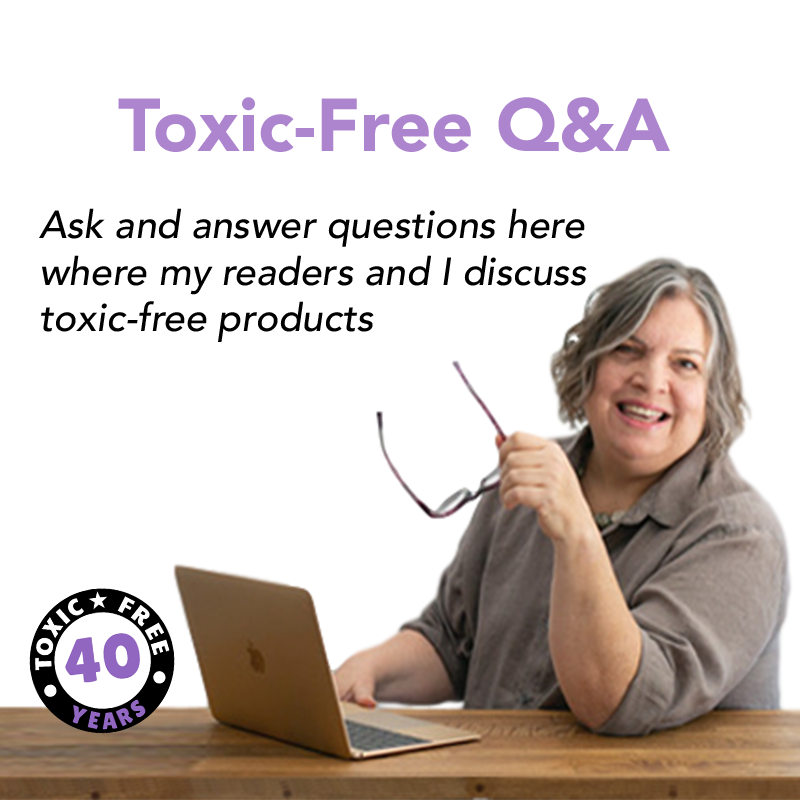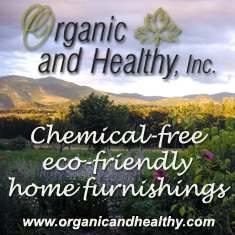
Submitted questions will be posted with my response by the following Tuesday or before.
Submitted comments will be moderated and approved within 24 hours.
pots and pans safe to use if they boil dry?
Question from Natalie
Hi Debra,
Are pots and pans that are accidentally left on the stove and boil dry still safe to use?
Thank you.
Debra’s Answer
I don’t know the answer to this one. Readers?
Vinyl PVC Window Blinds: How toxic?
Question from Eric Talaska
There are a lot of windows in my home with Vinyl PVC window blinds. I called the manufacturer to find out if they have lead and they don’t, so that’s good. But since they are made of Vinyl PVC, isn’t that toxic as far as outgassing, especially for the windows that the sun hits the most? I’m wondering whether I should go to the extent of replacing them with something more natural such as wood blinds. The blinds are two years old, so have outgassed some already, but I wonder how much more outgassing is left? Should I be concerned about the blinds that do not heat up from the sun? Will they still outgas without heat?
Debra’s Answer
Silicone cookware
Question from vivian
I came across your website while trying to get information about the safety of silicone cookware. I received a bright red tart pan for Christmas, and the first time I baked with it I noticed a distinctly odd odor. The nose is considered the “first line of defense” from an evolutionary standpoint, and if you can smell chemicals, they probably are leaching into your food. Silicone by itself may not be harmful, but what about the materials used to color it? I will definitely not cook with this again, the flavor and odor, while subtle, is definitely a cause for concern! Also, people’s ability to detect odors can be vastly variable, so many people will never notice this…Thanks for a great website.
Debra’s Answer
Pot scuff marks in the sink
Question from Debbie
Hi Debra –
The cleaning products I use in my home are just about 100% natural, my only problem is that I like commercial cleansers, especially when it comes to cleaning scuff marks off a porcelain sink – I read once where you can use pumice to get these marks off, but it doesn’t work – I also use commercial cleanser to clean my shower, I have a white shower pan and I can’t find anything that gets it really white that doesn’t have bleach in it?
Thanks
Debra’s Answer
I personally am not so concerned about getting sinks and showers “really white” as long as they are clean.
Readers, what do you use?
Honey not good to cook with
Question from Bob Jordan
Debra:
Awhile back you ran a dessert recipe I don’t remeberer which and suggested a number of alternatives to the sweetener in the recipe one of which was honey. I should have commented then but better late than never, honey when heated to high temperatures becomes a glue like substance. Ayurvedic has long considered it a no no to cook or bake with honey. My source for this information is the Ayurvedic Cookbook by Amadaea Morningstar and Urmila Desai.
Debra’s Answer
Nontoxic Snake Repellent
Question from Sydney Blum
I am looking for a non-toxic snake repellent. I tried an herbal mixture from Australia and the snakes just sat in it without a care. Any ideas that really work?
Debra’s Answer
Readers? Anyone have any experience with this? We only have small garden snakes here, so I don’t know how to repel snakes.
Local Honey Helps Allergies
You may already know that raw, local honey can reduce allergies, but here’s why.
Unprocessed honey, which contains bits and pieces of bee pollen and honey (and sometimes even the honey comb, as well as propolis and live enzymes) is a super immune system booster.
The reason local honey is particularly effective is because the bees are collecting pollen from the very same plants that you are exposed to, and it will be present in the honey. Though it may sound strange that the very same pollen that causes problems for our bodies with direct exposure can also be the antidote to allergies reactions after it is processed by bees, but it is true. Apitherapy (medical treatments derived from bee products) goes back 5000 years to China and the Middle East.
This good effect works best when honey is taken a little bit (a couple of teaspoons) each day for several months prior to the pollen season.
Now, the other day I was walking through my local flea market, and passed a booth where a woman was selling seasonal local honey! This was the first time I had seen this and I was delighted! The beekeeper explained that she bottles the honey just as she takes it out of the hive. Of course, bees would produce honeys with different pollens and different flavors throughout the year because different plants are producing pollen in different seasons. In our consumer world where most everything is produced for uniformity, this seasonal difference is eliminated. But here it was, in glass jars right in front of me.
These bees pollinate strawberries and blueberries in the winter, citrus in the spring, watermelons in summer and many other plants. The strawberry honey I tried tasted vividly of strawberries. It was delicious!
So look for local honey at your farmer’s market, flea market, and natural food stores, and see if you can find some that is also seasonal.
Here’s a seasonal honey from New England: Carlisle Honey.
Advance: Researcher studying honey as possible allergy remedy
Local Honey and Allergies
NOTE: Some people can have allergic reactions to the honey itself, so proceed with caution if you are very sensitive.
Honey Can Help Prevent Cancer
In a study at the University of California, Davis, when research subjects were fed four or more tablespoons of buckwheat honey each day, after 29 days blood samples showed increased levels of antioxidants that help protect the body against cancer and heart disease.
But you don’t need to eat this much honey and it doesn’t need to be buckwheat to be effective. The rule of thumb is: the darket the honey, the more antioxidants.
Do eat your honey raw, and space it out throughout the day to minimize blood sugar spikes. Eating it with fat or protein will also help keep blood sugar even.
water filter confusion- help!
Question from Jessica
Hi Debra,
Thank you for your excellent and insightful early pioneering into household greening and health questions.
I have some water filter questions. I understand the basic types of filters (carbon, reverse osmosis, and distillation, or a combo) and I am looking for an excellent filter for drinking water, as well as a whole house alternative if I decide to do that, or recommend it to others.
The problem is that so many brands and websites are incomplete, misleading, or confusing. There is just too much information! I spent almost an hour talking to a guy that sells a water filter that Dr. Andrew Weil uses, and at the end of the conversation, STILL couldn’t tell what I should do, or what to tell other people who ask me all the time. (I did, however, figure out that distillation plus carbon is my best bet, maybe- but still have no idea which one to get.) So here are my questions:
Sorry for the length of the question, but there is not a lot on this out there, and I sincerely appreciate your feedback!
Thanks,
Debra’s Answer
Well, Jessica, I understand your bewilderment. There is a lot of information to understand and apply in making decisions about water filters. I’m working on writing a guide to water filters just to address this, but in the meanwhile I will attempt to answer your questions. There’s also a whole chapter about choosing water filters in Home Safe Home.
1. There is not ONE particular type of water filter that I recommend because each source of water needs to have the type of filter appropriate to it, depending on the pollutants that need to be removed. So you need to find out, number one, what is in your water, and then match the appropriate filter to it.
2. Water filters have changed a lot in the past few years and I need to review what is currently available (thus the aforementioned guide). But that takes time. It’s a big project that I need to work in between everything else I am doing. A fair price could be a wide range, depending on what you are buying and the size of the filter–how much water is being filtered.
3. Water ionizers do not filter water. They split the water molecule to make two batches of water–one “acid” and the other “alkaline.” I don’t consider them to be dangerous. My understanding is that the alkaline water is more “alive” and closer to water in it’s natural state than tap water is.
4. I haven’t done an environmental analysis on the different types of water filters. Offhand I would say a distiller uses electricity, reverse osmosis wastes water, and a carbon filter doesn’t do either.
Since choosing a water filter is a very individual decision, I can best help by discussing your needs and options in a telephone consultation.
Blog Will Resume March 26
I’m taking a Spring Break to go speak at the Women’s Wellness Retreat in Lake George NY, sponsored by Natural Health magazine.
I won’t be moderating the blog while I’m away, but you are welcome to post new questions and comments and I will review and post them when I return.







